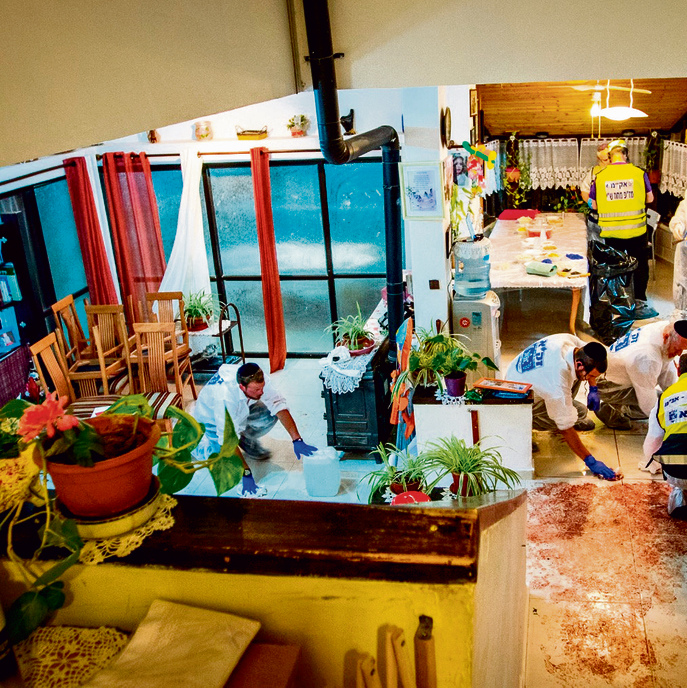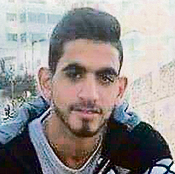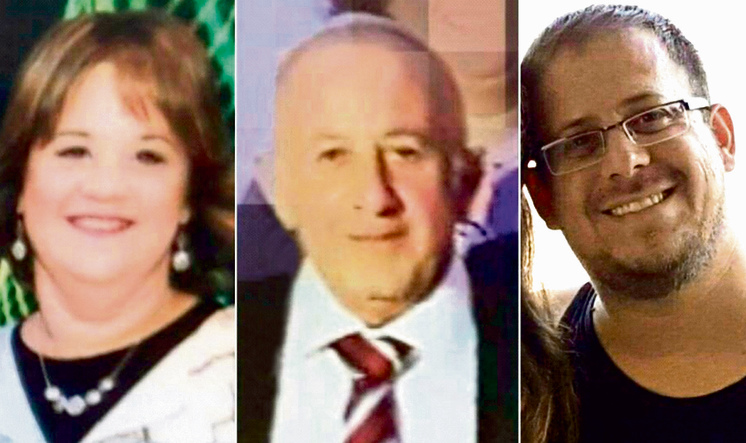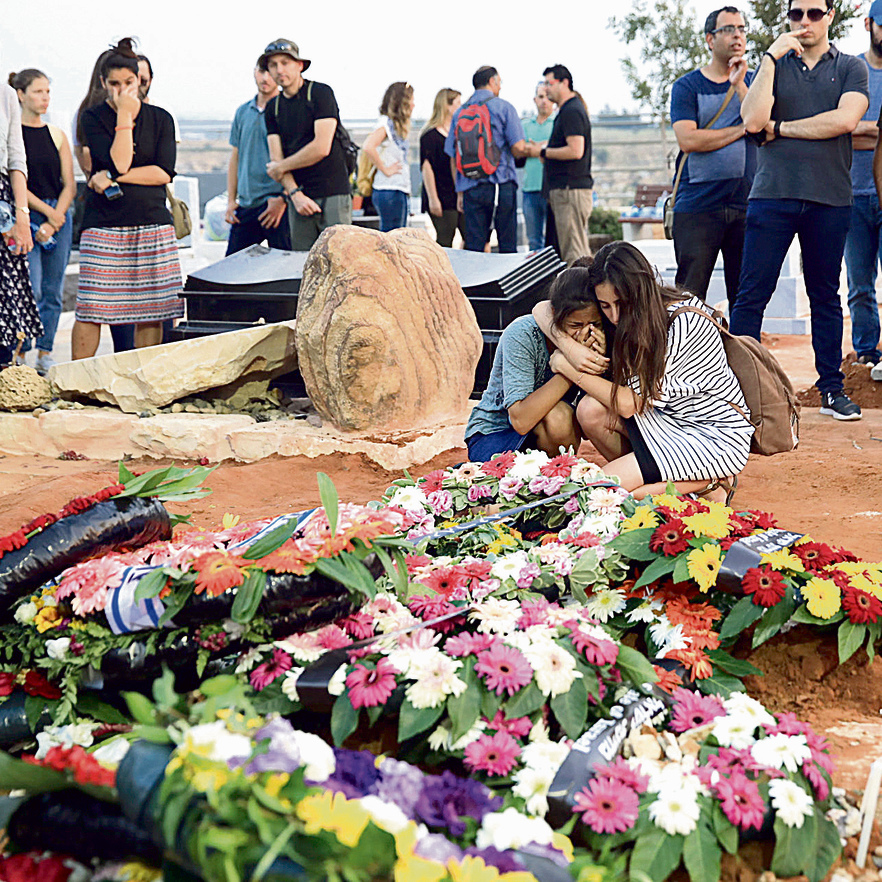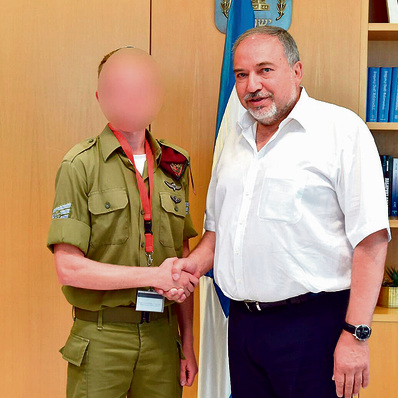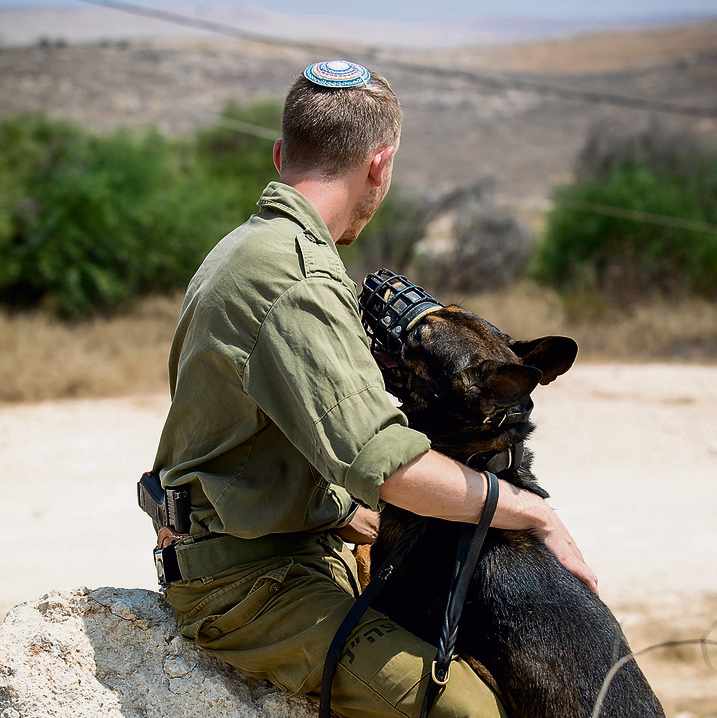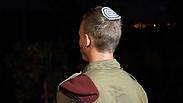
Elor Azaria wasn’t on my mind, says soldier who shot Halamish terrorist
With one accurate gunshot through a closed window, in poor lighting and with perfect composure, Staff Sergeant A. neutralized the 19-year-old Palestinian who murdered three members of the Salomon family in their home last July. In an extensive interview, the Oketz Unit fighter who was awarded a citation for his courage recounts what happened that night and how he saved the life of his former kindergarten teacher.
A modest and shy person, A. wasn’t very eager to talk to us about what happened that night last July in the West Bank settlement of Halamish. “I didn’t think I should say more than those few words I told the people from the IDF Spokesperson’s Unit, who filmed me on the Saturday evening after the attack,” he explains. Eventually, after calling off an interview that had already been scheduled with him, he agreed to talk.
“I understood it was important for people to hear first-hand what really happened there that night, especially after all kinds of not very accurate rumors were spread,” he explains.
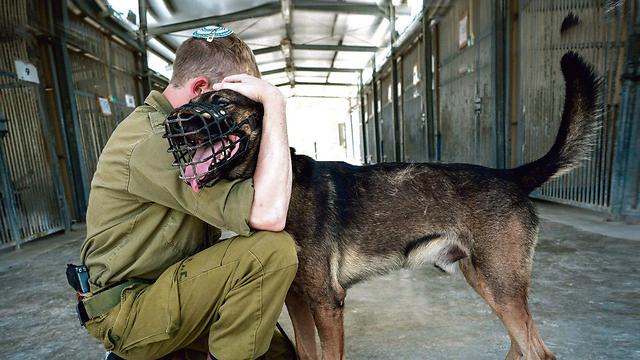
His parents—his father works in high-tech and his mother is a dentist—immigrated to Israel from England in 1986. He was born and raised in Halamish. The family is national-religious and has four sons and three daughters. A. is the sixth child. His three older brothers all served as fighters in elite units.
“I had a regular childhood,” he says of the years he spent in the community as a child. He knew the Salomon family, which lives across the small road, very well. “When I was small, Tova was my kindergarten teacher in the community. We were very close neighbors. The relations between the families were very good.”
He studied at the Netiv Meir High School Yeshiva in Jerusalem. In the 12th grade, he partook in a program in which students in their final year volunteer in development towns. “I moved to the city of Kiryat Gat and completed my matriculation exams there. While living there, I volunteered in the community, coordinating the Bnei Akiva movement’s activities. At the end of that year, I opted for another year of studies, this time at a high yeshiva in Givat Olga.”
In 2014, he joined the IDF. “I like dogs and I thought it would be interesting to serve in Oketz (a canine special forces unit),” he says. “I joined the Kfir Brigade, which is the way of getting to Oketz, and underwent the unit’s preparatory training.”
At the end of long and exhausting training, A. was qualified as a fighter in the unit and installed in its explosives subdivision. That’s when he met Jack, a German shepherd, who became his regular dog and the great love of his life.
“We went on many patrols and activities together,” he says. “I was with him for half a year in the 91st Division in the north. He’s an amazing dog. Today, he already has a different fighter working with him, so I stay away from him so as not to confuse him.”
In Oketz, A. served in a number of roles. He was a team commander, a squad commander in the squad commanders’ course, and in the past eight months he has been serving as a sergeant in the unit’s training department, under team commander Lieutenant A.
He has already dealt in the past with the terror threats in his community, Halamish. “Three years ago, just before I enlisted, two Palestinians entered our home,” he recalls. “I wasn’t home. My little sister, who was 16 at the time, was there with her boyfriend. They were watching television in her room, when they suddenly spotted two strangers inside the house, outside the room, A sort of struggle erupted there. My sister and her boyfriend threw stuff at them, and they locked them in the room. I had just returned home. I discovered an open door and saw two strangers in the kitchen.”
Just like in the Salomon home three years later, A. exercised discretion. He didn’t rush into the house to confront the two on his own, but ran to the nearby home. “The son of the family living there was a soldier, and within seconds he came back with me to the house with a weapon, went in and combed the place. But they had already escaped,” A. recounts.
“Such an incident, which may have started off as a criminal event, could have easily developed into a terror attack. We can’t know for sure what they were planning to do in our house, but I have a hunch that they weren’t looking to rob us. When I arrived, I found them in the kitchen. That’s not a place where you look for money or jewelry. It’s where you look for knives.”
Commander's decision saved lives
On the weekend of July 21, 22-year-old Staff Sergeant A. was supposed to stay at the Oketz Unit base on Shabbat duty. “I wasn’t even supposed to go home that Shabbat,” he says. “Lieutenant A., the team commander who serves with me, said to me spontaneously: ‘Go, it’ll be a shame if we both stay.’ I mulled the offer. I said to him, ‘Why don’t I stay and we’ll do Shabbat together?’ Eventually, I went home on Thursday at midnight.
Later, it turned out that the team commander’s spontaneous decision had saved the lives of Tova Salomon, her daughter-in-law Michal, and Michal’s five small children. The other family members in the house infiltrated by the terrorist that night were Tova’s husband Yosef and their two children, Chaya and Elad. The three of them were murdered.
The indictment filed with the Military Court in Judea against the terrorist, 19-year-old Omar al-Abed, reveals that he decided to carry out the attack following the Israeli response to the Temple Mount attack on Friday, July 14, which left two police officers—Advanced Staff Sergeant Ha'il Satawi and Advanced Staff Sergeant Kamil Shnaan—dead. According to the indictment, he planned to obtain an explosive belt or firearms, but was unsuccessful. He decided instead to carry out a stabbing attack in the community of Halamish, which is close to the Palestinian village of Kobar, where he lives.
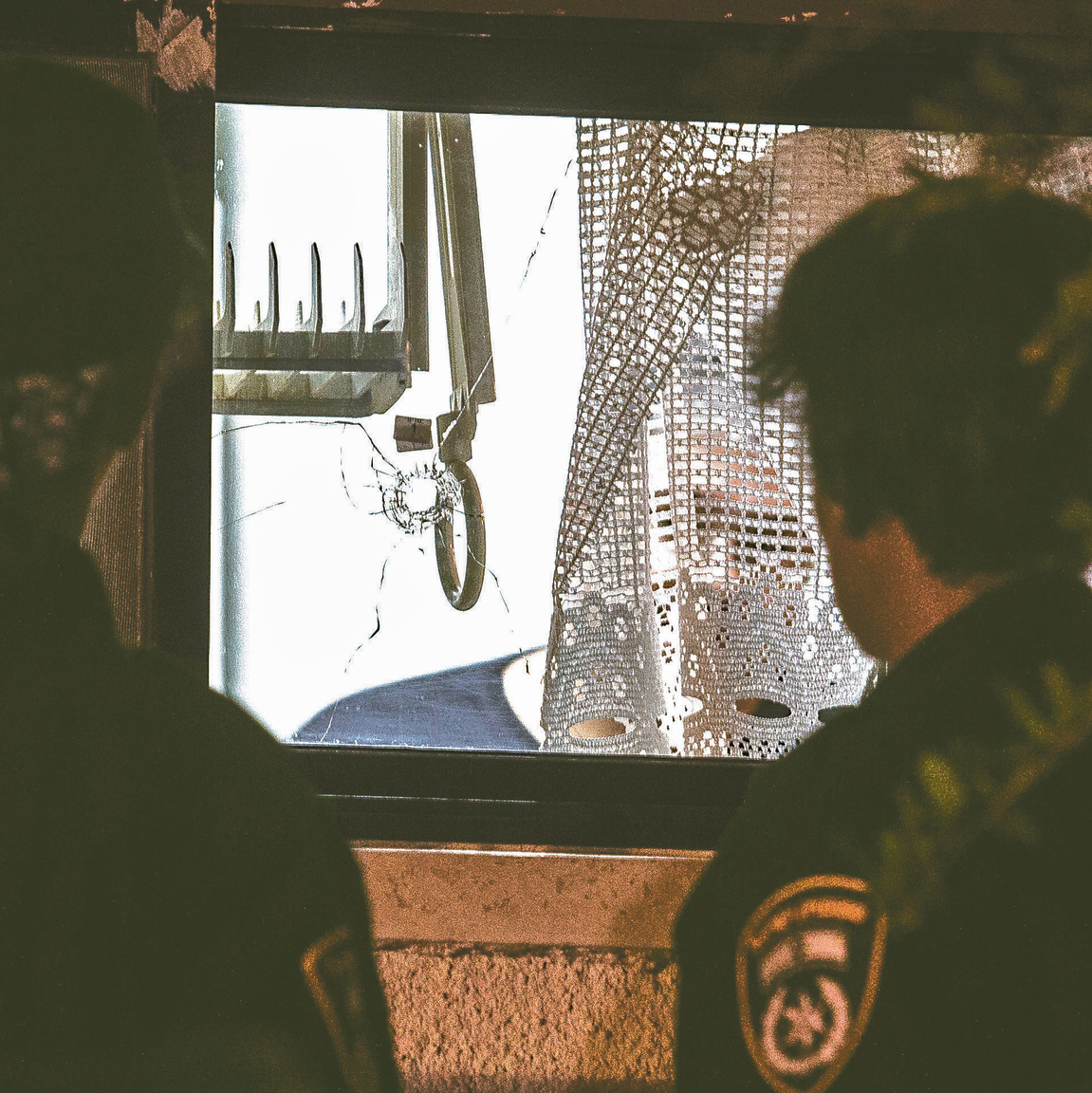
According to the indictment, al-Abed took a 22-centimeter (8.5-inch) butcher knife from his father’s store, and on Friday, July 21, exactly one week after the Temple Mount attack, he infiltrated the community of Halamish after crossing four fences. When he noticed the lights in the Salomon home and heard the sounds of laughter coming out of the house, he decided to enter and execute his murderous plan.
The indictment describes the actions of a cold-blooded and brutal murderer: “The defendant opened the front door and entered the house, holding a knife. As soon as he entered, he was spotted by Michal, who shouted at her children to run up to the second floor and locked herself up with them in one of the bedrooms. The defendant stood in front of Chaya and said, ‘What about al-Aqsa?’ before stabbing her once in the chest with the knife, pushing the entire blade into her body.
“Tova, who was standing next to Chaya, started shouting at the defendant to get out of the house and bent down to the floor. The defendant stabbed Tova in the back with the knife, and Tova began screaming ‘terrorist’ and fled to the second floor of the house.
“The defendant than proceeded into the house and stabbed the grandfather, Yosef, in the stomach with the knife. Elad then jumped on the defendant and tried to grab the knife from him. The defendant stabbed Elad three times in his body, but Elad managed to snatch the knife from the defendant’s hand and tried to protect himself from him. The defendant stood on the hand Elad was holding the knife with, grabbed a wooden cutting board and hit Elad’s head with it twice powerfully, until the board broke. The defendant picked up a knife that was attached to the cutting board and stabbed Elad in the head with it twice. As a result, the knife fell out of Elad’s hand, and the defendant picked it up and stabbed Elad about 12 times in different spots in his body, until Elad stopped moving.
“The defendant then approached Yosef, who was lying on the floor, once again. He noticed he was still breathing despite his serious wounds. The defendant therefore stabbed Yosef about 15 more times in different places in his body, until Yosef stopped moving.”
And then, at that moment, as the terrorist moved away from Yosef, possibly on his way to look for other family members in the house, Staff Sergeant A. managed to neutralize him with a single accurate gunshot through the window.
After hearing the details of the horrific murder, Prime Minister Benjamin Netanyahu said during a condolence visit to the Salomon family a in Elad that al-Abed should be sentenced to death. Defense Minister Avigdor Lieberman and Education Minister Naftali Bennett voiced their support for the death penalty too, and the Salomon family members would also like to see the terrorist executed. After IDF forced demolished the al-Abed family home following the attack, Michal Salomon said: “Their house can be rebuilt, but my house has been destroyed forever. We need a death penalty so that these terrorists will never be able to rebuild their homes.”
In late August, the Military Court in Judea convicted five of al-Abed’s relatives of knowing about his intention to carry out the attack, but failing to notify the security authorities. His father was sentenced to two months in prison and his mother, who was also convicted of incitement over comments she made after the attack in a video distributed on social media, was fined and sentenced to a month in jail. His two brothers and his uncle were sentenced to eight months in prison. The five family members received a suspended prison sentence as well. After the attack, the terrorist’s family stated that it was “a natural reaction” to the events at the al-Aqsa Mosque.
‘We heard someone screaming in horror’
A. has a clear memory of the events of that Friday night, and he will likely never forget what happened. “In the morning, I went to buy clothes for my little sister’s wedding,” he says. “In the evening, we sat down for dinner—just my parents, my maternal grandmother and me.”
When he starts describing what happened that evening, the smile leaves his face. “In the middle of the meal, we suddenly heard someone screaming in horror,” he recounts. “We understood that something unusual was going on, because the screams were beyond reasonable. My father and I went outside, towards the Salomon house across the street, where the screams were coming from. Through the window, I saw a struggle going on inside the house, and I immediately realized it involved a terrorist. I ran home to get my gun.”
And your father?
“I shouted at him, ‘Don’t go in there without a weapon.’ Later, however, I learned that he had gone in, glanced into the house, seen the blood and the terrorist and turned around to call me and to bring his own weapon.
“In the meantime, I returned with the gun. I glanced through the window and saw the terrorist. He had just ended his struggle with Elad, may he rest in peace. I saw Yossi, may he rest in peace, lying on the floor behind him. I directed the weapon at the terrorist through the closed window and fired one bullet. He immediately fell backwards. In the meantime, my father returned with his weapon and we both entered the house. The first thing we did was look around to see if there was another terrorist. My father pushed the knife away from the terrorist and directed the barrel at him.
“I went up to the second floor to see if there were any other terrorists in the house. Upstairs, I saw Tova lying on the couch, wounded. I asked her if there had been another terrorist. As soon as she said there had only been one, we started tending to the wounded. In the meantime, my mother called my sister who lives in the community, and my brother-in law arrived shortly afterwards and cuffed the wounded terrorist.”
What happened in the house during those moments?
“Elad and Yossi were lying on the floor, drawing their last breaths. Michal came down and saw everything. There was a feeling of helplessness. We realized it was irreversible. I went outside and called out to the neighbors for help. I began tending to Tova, who had been seriously stabbed in the back by the terrorist. Because the stabs were in the back, I couldn’t apply a tourniquet. I stopped the blood with my hands.”
Did she say anything to you?
“She told me she had opened the door to the terrorist and he had stabbed her. She kept asking me, ‘What about Yossi? What about Elad? What about Chaya?’ I told her I didn’t know. I tried to calm her down. I said they were being taken care of.”
Meanwhile, the rescue forces and the community’s residents arrived at the Salomon home. “That evening, Tova and Yossi were celebrating the birth of a grandson and performing what is known as “sholem zocher”—a sort of toast for people arriving to congratulate them. At first, the people who arrived didn’t understand what had happened. They came to congratulate and encountered a terror attack.”
It was reported that the wounded terrorist jumped up and tried to attack the rescue forces.
“He didn’t jump and didn’t attack. It simply didn’t happen. He was completely neutralized. My father pinned him to the floor with the weapon. And my brother-in-law, who was one of the first people to arrive at the Salomon home, handcuffed him, as I said before. He was incapable of attacking anyone.”
Some people wondered if you avoided killing the terrorist because of the Elor Azaria case.
“I didn’t even think about it throughout the event. As soon as my first shot neutralized him, the thought of shooting him again didn’t even cross my mind. The immediate decision was to search for other terrorists in the house, and when it turned out there weren’t any—to tend to the wounded. I didn’t think about anything. My actions were automatic. The terrorist was no longer a threat. So Azaria who? He wasn’t on my mind during those moments.”
‘I couldn’t sleep’
The terrorist’s infiltration into the Salomon home resulted in the murder of 70-year-old Yosef Salomon, his 46-year-old daughter Chaya, and his 35-year-old son Elad, who fought the terrorist for a long time. Yosef’s wife, Tova, was seriously wounded. Michal, Elad’s wife, courageously took three of her children (aged 11, nine and five) upstairs to the second floor and hid with them in the room where her one-year-old twins were sleeping. From that room, Michal called the police.
Among the forces that arrived at the house were friends of Staff Sergeant A. from the Oketz Unit. “We had just ended the Shabbat meal at the base when we were dispatched to his community,” says Lieutenant A., the team commander who stayed at the base that Shabbat and let A. go home. “A General Staff team was dispatched to the place, and the Oketz fighters and their dogs were of course part of it.
“And then I received a phone call from A. I was surprised that he was calling me on a Friday night, but I imagined he wanted to report the incident. I immediately answered the phone and said, ‘There’s a terrorist who carried out an attack in Halamish. The team is on its way.’ He replied, ‘I know. I neutralized him. I shot a bullet into his stomach and he fell down.’
“I immediately called the duty officer, who was on his way over there, and informed him that our A. had already neutralized the terrorist.”
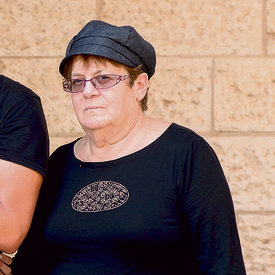
The rescue forces arrived at the house shortly afterwards. A., who left before they arrived to seek the neighbors’ help, spotted Chaya’s body in the yard. She had tried to go out and call for help, but collapsed and died from the stab wounds.
A. says he was unable to sleep that night.
"I gave my testimony to the police officers who arrived there, but I couldn’t go to sleep afterwards,” he recalls. “You can’t fall asleep after such an incident. The adrenaline is sky high. I sat down with my parents and with friends from the community who came over. I also spoke to the council’s clinical psychologist and we processed the incident together.
“On Saturday morning, Chief of Staff Gadi Eisenkot and Defense Minister Avigdor Lieberman visited the community. They asked me what had happened and I told them, and on Saturday evening all the media arrived. My phone was swamped with text messages and questions on my different WhatsApp groups. Halamish is a small community. When there’s a report about A. from the Oketz Unit, it doesn’t take much to realize it’s me. I only answered my closest friends. The burden was simply insane, and I wanted some peace and quiet.”
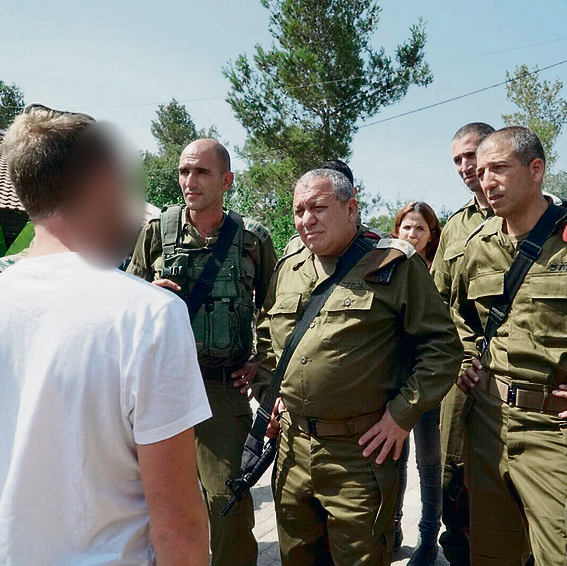
A. was also in touch with his team commander that night. “After things calmed down a bit, I told our soldiers what happened to A., their commander,” Lieutenant A. says. “I repeated the things he told me, and I called him several times that evening. In each conversation, he provided me with more details about what exactly happened there, and I passed it on to the soldiers. They are young people training as fighters in the unit, and they were shocked to be so close to the incident, to realize it could happen to anyone. They were all proud of their commander’s performance.”
Have you met the Salomon family members since the event?
“Of course,” says Staff Sergeant A. “On Sunday morning, I went to visit Tova at the hospital. She was very excited. She hugged and thanked me. It was important for her to tell me that I did what was expected of me. Later, I travelled to Elad and Michal’s home in the city of Elad, where they were sitting shiva. Michal is an amazing woman with remarkable powers. We hadn’t known each other personally until then. It was important for her too to tell me that I did what I had to do and that there were not enough words for her to express her gratitude.”
‘With a great amount of courage’
A. returned to his unit on Monday. “I arrived straight into a training session with the soldiers,” he says. “My soldiers all knew what happened of course, and they were very excited by my return. They felt comfortable asking questions, and I explained exactly what had happened so that they would get a first-hand account. I presented it to them stage by stage: Interpreting the situation—understanding that it’s a terror attack; identifying the stimulus—the terrorist—and neutralizing it; after he falls down, proceeding to search for the next threat; and when it’s clear that the scene is safe, tend to the wounded. Of course I also discussed the important of personal training, control and the right use of a gun.”
Staff Sergeant A.’s performance during the event did not go unnoticed in the Oketz Unit. As first reported by Yedioth Ahronoth, his commanders recommended that he be awarded a citation for his conduct during the event, and the recommendation was approved by Central Command chief Roni Numa.
“There is no training for a situation like the one A. dealt with in any stage of training a fighter,” explains Major Or, the Oketz Unit’s assistant chief of staff for operations. “Fighters are trained to deal with a terrorist holding a knife, following all the stabbing incidents against soldiers, but in this case it was something else, in a civil location.
Although A. wasn’t specifically trained for such a scene, you can see in every stage of his conduct how he used the world of content and abilities he accumulated during his service, starting from the decision when and how to fire the first shot that immediately neutralized the terrorist and to the decision to move on to ensure—with a great amount of courage—that there were no more terrorists in the house.
“You have to understand, he went up to the second floor without knowing what he would encounter there, without knowing whether there was another terrorist up there or two or three. He didn’t stop and wait for reinforcement, but went up in a bid to end the incident, to clarify that ‘I am the solution.’ He did it without a rifle and magazines, only with a gun which had 14 bullets left in it, after he had already fired one bullet at the terrorist.
“It’s a very difficult scene. There are wounded people lying around, there’s blood, and he goes up on his own to inspect the second floor, knowing that he’s going up to fight and that he may even get hurt and die. It’s a very powerful move. I would like every fighter to do the same.
“I fought in Operations Cast Lead and Protective Edge, I faced difficult situations and incidents, but there’s no comparison. It’s completely different when you’re in a fighting mode, with a force fighting by your side, with a bullet-proof vest and friends who have your back. When we fight as soldiers against an enemy, we know we have an advantage. It’s an entirely different situation when you’re home on Friday evening, in vacation mode, in festive white clothes. It’s perfectly clear to me why they decided that he deserves a citation.”
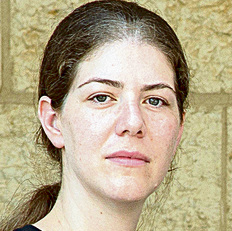
When the decision to award A. a citation was made public, the Salomon family members expressed their support too. “Michal spoke to me after it was published,” A. says. “She congratulated me and thanked me again for saving her life and the rest of the family members who stayed alive. Being awarded a citation is a great honor, but I’m receiving it with mixed emotions. I’m sad about the circumstances. I feel for the Salomon family, for their terrible loss. I never thought I would be awarded a citation during my military service, but I would definitely give it up if what happened could be erased.”
Despite his great love for dogs, A. doesn’t have a dog at his parents’ home in Halamish. “There’s no doubt that if a terrorist enters a house, a dog can be very helpful,” he admits. “Even if the terrorist just hears barking or spots a kennel in the yard or a sign warning that there is a dog on the premises, he will avoid entering the house.”
There was no dog in the Salomon home either. “I remember they had a dog several years ago, a small French bulldog. He used to snore more than he barked, but a dog—especially one which is trained to defend—can sometimes change the picture entirely.”
In November, assuming he doesn’t decide to stay on for permanent service, Staff Sergeant A. is expected to complete his IDF service. He is already thinking about a post-army trip, about dedicating some time to his hobbies—running, playing guitar and surfing, and maybe even about meeting someone. “I don’t have a girlfriend,” he admits shyly. “It’s a shame you can’t publish my picture. I may have received appeals by now,” he laughs.
‘The force doesn’t move an inch without a dog’
The Oketz canine unit is one of the IDF’s elite units and is considered a world leader in its field. Its fighters specialize in three areas with their dogs: Offense, uncovering explosives and pursuits. As part of the intensive war on terror in the territories, Oketz has become one of the busiest units in the IDF. Hardly any operational activity is launched today without an Oketz fighter and his dog leading the force.
When terrorists are believed to be hiding in a certain building, a dog is sent there before the soldiers to attack the terrorists and make it easier to capture them. However, if a terrorist is identified for certain in the building, the soldiers avoid setting the dog on him, both to spare the dog’s life and because of the high cost of purchasing and training a new dog. The unit’s dogs are also tasked with uncovering explosives and weapons, and well as with chasing terrorists in suspected infiltrations.
The Oketz Unit is very popular among new recruits. The training of fighters in the unit, until they can go out on their own to lead a military force with a dog, is one of the longest training sessions in the IDF—about 16 months.
Oketz is considered the leading unit in the world in its field and often hosts representatives from many foreign armies, who come to learn and undergo training with dogs. According to foreign reports, the American Marine Corps in Iraq used dogs who had been trained in the IDF’s Oketz Unit.
Most of the unit’s dogs are of the Malinois breed (a variety of the Belgian Shepherd) or German Shepherd. They are purchased by the IDF from natural habitats in Europe. Due to the high demand for these dogs in similar units around the world, the price of one puppy could reach thousands of euros. Oketz has its own natural habitat as well, and the finest puppies there are designated for the unit.
In recent years, Oketz has developed new abilities to assist in the exposure of Hamas’ offensive tunnels. Most of the information about these abilities is confidential, but it has been revealed the unit’s dogs play a very important part in this sensitive and dangerous activity.
Four of the unit’s dogs were killed in the Gaza Strip during Operation Protective Edge. In two tunnel uncovering incidents, the dogs died while saving the lives of the soldiers around them. During the operation, the unit’s dogs focused on locating explosive devices planted by Hamas in dozens of homes, especially along tunnel shafts reached by the IDF fighters, in an attempt to target the soldiers and protect the tunnels, their strategic asset.
"There’s not a single force today that moves an inch without a dog,” a senior officer in the Gaza Division said during the operation, defining the area as having “the largest concentration of explosive devices, therefore requiring exceptional life-saving abilities from the dogs.”
In the Oketz Unit, dogs are treated as fighters for all intents and purposes. Dogs killed during operational activity are given a military burial and are buried in a dog cemetery at the unit’s base.










